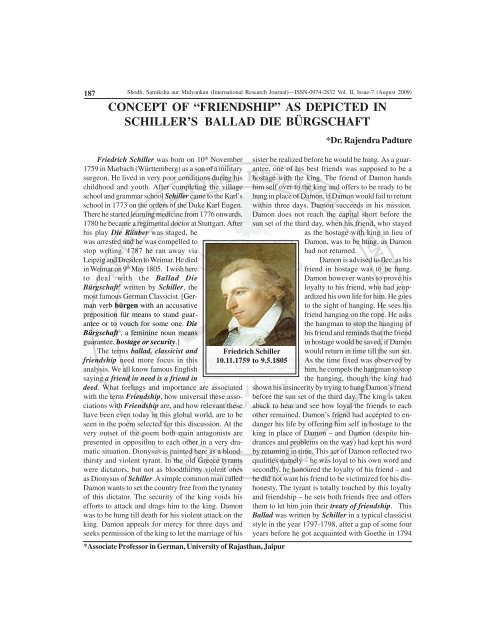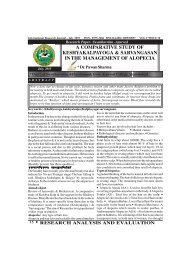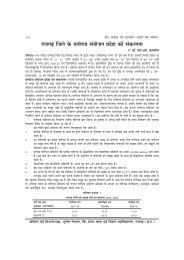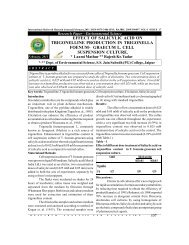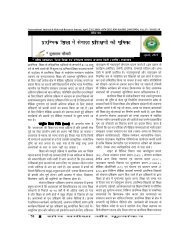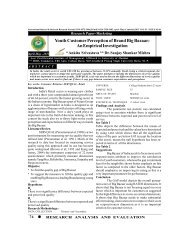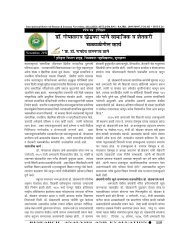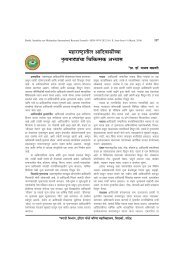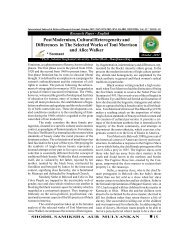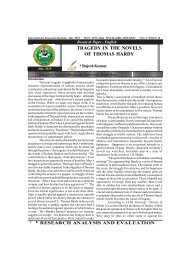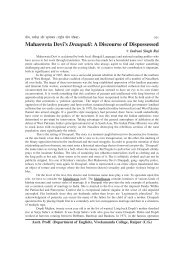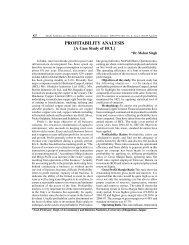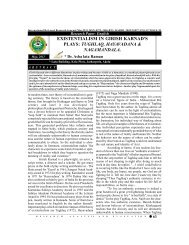concept of “friendship” - international indexed refereed research ...
concept of “friendship” - international indexed refereed research ...
concept of “friendship” - international indexed refereed research ...
Create successful ePaper yourself
Turn your PDF publications into a flip-book with our unique Google optimized e-Paper software.
187<br />
Shodh, Samiksha aur Mulyankan (International Research Journal)—ISSN-0974-2832 Vol. II, Issue-7 (August 2009)<br />
CONCEPT OF “FRIENDSHIP” AS DEPICTED IN<br />
SCHILLER’S BALLAD DIE BÜRGSCHAFT<br />
*Dr. Rajendra Padture<br />
Friedrich Schiller was born on 10 th November<br />
1759 in Marbach (Württemberg) as a son <strong>of</strong> a military<br />
surgeon. He lived in very poor conditions during his<br />
childhood and youth. After completing the village<br />
school and grammar school Schiller came to the Karl’s<br />
school in 1773 on the orders <strong>of</strong> the Duke Karl Eugen.<br />
There he started learning medicine from 1776 onwards.<br />
1780 he became a regimental doctor at Stuttgart. After<br />
his play Die Räuber was staged, he<br />
was arrested and he was compelled to<br />
stop writing. 1787 he ran away via<br />
Leipzig and Dresden to Weimar. He died<br />
in Weimar on 9 th May 1805. I wish here<br />
to deal with the Ballad Die<br />
Bürgschaft 2 written by Schiller, the<br />
most famous German Classicist. [German<br />
verb bürgen with an accusative<br />
preposition für means to stand guarantee<br />
or to vouch for some one. Die<br />
Bürgschaft 3 , a feminine noun means<br />
guarantee, hostage or security.]<br />
The terms ballad, classicist and<br />
friendship need more focus in this<br />
analysis. We all know famous English<br />
saying a friend in need is a friend in<br />
deed. What feelings and importance are associated<br />
with the term Friendship, how universal these associations<br />
with Friendship are, and how relevant these<br />
have been even today in this global world, are to be<br />
seen in the poem selected for this discussion. At the<br />
very outset <strong>of</strong> the poem both main antagonists are<br />
presented in opposition to each other in a very dramatic<br />
situation. Dionysus is painted here as a bloodthirsty<br />
and violent tyrant. In the old Greece tyrants<br />
were dictators, but not as bloodthirsty violent ones<br />
as Dionysus <strong>of</strong> Schiller. A simple common man called<br />
Damon wants to set the country free from the tyranny<br />
<strong>of</strong> this dictator. The security <strong>of</strong> the king voids his<br />
efforts to attack and drags him to the king. Damon<br />
was to be hung till death for his violent attack on the<br />
king. Damon appeals for mercy for three days and<br />
seeks permission <strong>of</strong> the king to let the marriage <strong>of</strong> his<br />
*Associate Pr<strong>of</strong>essor in German, University <strong>of</strong> Rajasthan, Jaipur<br />
sister be realized before he would be hung. As a guarantee,<br />
one <strong>of</strong> his best friends was supposed to be a<br />
hostage with the king. The friend <strong>of</strong> Damon hands<br />
him self over to the king and <strong>of</strong>fers to be ready to be<br />
hung in place <strong>of</strong> Damon, if Damon would fail to return<br />
within three days. Damon succeeds in his mission.<br />
Damon does not reach the capital short before the<br />
sun set <strong>of</strong> the third day, when his friend, who stayed<br />
as the hostage with king in lieu <strong>of</strong><br />
Damon, was to be hung, as Damon<br />
had not returned.<br />
Damon is advised to flee, as his<br />
friend in hostage was to be hung.<br />
Damon however wants to prove his<br />
loyalty to his friend, who had jeopardized<br />
his own life for him. He goes<br />
to the sight <strong>of</strong> hanging. He sees his<br />
friend hanging on the rope. He asks<br />
the hangman to stop the hanging <strong>of</strong><br />
his friend and reminds that the friend<br />
in hostage would be saved, if Damon<br />
would return in time till the sun set.<br />
As the time fixed was observed by<br />
him, he compels the hangman to stop<br />
the hanging, though the king had<br />
shown his insincerity by trying to hang Damon’s friend<br />
before the sun set <strong>of</strong> the third day. The king is taken<br />
aback to hear and see how loyal the friends to each<br />
other remained. Damon’s friend had accepted to endanger<br />
his life by <strong>of</strong>fering him self in hostage to the<br />
king in place <strong>of</strong> Damon – and Damon (despite hindrances<br />
and problems on the way) had kept his word<br />
by returning in time. This act <strong>of</strong> Damon reflected two<br />
qualities namely – he was loyal to his own word and<br />
secondly, he honoured the loyalty <strong>of</strong> his friend – and<br />
he did not want his friend to be victimized for his dishonesty.<br />
The tyrant is totally touched by this loyalty<br />
and friendship – he sets both friends free and <strong>of</strong>fers<br />
them to let him join their treaty <strong>of</strong> friendship. This<br />
Ballad was written by Schiller in a typical classicist<br />
style in the year 1797-1798, after a gap <strong>of</strong> some four<br />
years before he got acquainted with Goethe in 1794<br />
Friedrich Schiller<br />
10.11.1759 to 9.5.1805
‡ÊÊappleœ, ‚◊ˡÊÊ •ÊÒ⁄U ◊ÍÀÿÊ¢∑§Ÿ (•ãÃ⁄U⁄UÊCÔ˛UËÿ ‡ÊÊappleœ ¬ÁòÊ∑§Ê)—ISSN-0974-2832,Vol. II, Issue-7 (August 2009) 188<br />
and became his fast friend. The bosom friendship and<br />
the reciprocal trust are at the centre <strong>of</strong> the happening<br />
in the poem, which is necessarily a characteristic <strong>of</strong><br />
Classicism. Harmony and Unity are the two virtues <strong>of</strong><br />
Classicism. The tyrant happens to distract this harmony<br />
and unity. Humanity and self discipline make<br />
the sense <strong>of</strong> security, hostage [Bürgschaft]. A drastic<br />
change in the opinion, attitude and behaviour <strong>of</strong> the<br />
tyrant is seen. His recognition <strong>of</strong> their friendship based<br />
on mutual trust and his judgement to set them free –<br />
not only this, his request to them to let him join their<br />
friendship treaty, is a big change in the tyrant, when<br />
he becomes a king and not a tyrant.<br />
The word Ballad emerges from the French Balada<br />
that originates from the Italian Ballata, which is derived<br />
from the Latin verb Balare – meaning to dance.<br />
Originally it meant a dancing song. The mixture <strong>of</strong> lyric,<br />
narrative and dramatic elements had made the Ballad a<br />
very popular form. Schiller’s Ballads are an effort to<br />
bridge the gap between a common man and an educated<br />
man through the generally human and clear presentations<br />
<strong>of</strong> the stuff. Ballad is normally a Poesie with<br />
a serious theme. Mostly a conflict <strong>of</strong> a human being<br />
with his fellow human beings or with the nature is depicted<br />
in the Ballad. Schiller deals with the theme<br />
Friendship and Loyalty in the Ballad Die Bürgschaft<br />
– To keep his word, Danton has to develop super human<br />
powers. Even the king attains the higher levels <strong>of</strong><br />
being a human by respecting the ideal behaviour <strong>of</strong><br />
Damon. Schiller’s Ballads aimed at the enrichment <strong>of</strong><br />
the Gènre. The Gènre Ballad belongs to the period <strong>of</strong><br />
Weimarer Classicism [Weimarer Klassik], which is<br />
basically the main phase from 1794 to 1805, the years<br />
<strong>of</strong> friendship and collective work <strong>of</strong> Goethe and<br />
Schiller. Goethe and Schiller in opposition to their<br />
choice <strong>of</strong> antique Gènres had opted for a popular form<br />
<strong>of</strong> expression to their philosophy. The year 1797 is<br />
called the Year <strong>of</strong> Ballads [Balladenjahr], when<br />
Schiller wrote most <strong>of</strong> his famous Ballads. Schiller<br />
took an impetus for this Ballad from his friend Goethe.<br />
The storming <strong>of</strong> the Bastille was on nine years before<br />
the completion <strong>of</strong> Bürgschaft, Ludwig the XVI was<br />
beheaded five years ago. Four years had passed since<br />
the Execution <strong>of</strong> Danton and Robespierre. The French<br />
Revolution had failed according to Schiller. According<br />
to him only the æsthetic upbringing <strong>of</strong> a human<br />
being would enable the rational order <strong>of</strong> the state.<br />
Schiller’s Letter about the æsthetic education <strong>of</strong> human<br />
beings (1795) tries to depict the element <strong>of</strong> Beauty<br />
and the question <strong>of</strong> the function <strong>of</strong> art in the framework<br />
<strong>of</strong> cultural development <strong>of</strong> mankind especially in<br />
the post era <strong>of</strong> French Revolution.<br />
For Schiller revolutionary social and political<br />
changes can take place, only if human beings have<br />
found their harmony. Schiller wanted self determination<br />
<strong>of</strong> human beings to take place through an education<br />
that brings forth the reception <strong>of</strong> art based on<br />
phantacy and rational thinking.<br />
In the same manner the Ballad begins here with a<br />
futile revolutionary effort, the futile violent attack on<br />
the Dictator, whose viciousness is predominantly depicted<br />
in the Ballad. The arrested assassin himself<br />
describes this as a criminal striving on his part.<br />
Let us read here the original German Ballad entitled<br />
Die Bürgschaft by Schiller 4 and its English<br />
Translation available 5<br />
German original<br />
Zu Dionys dem Tyrannen schlich<br />
Damos, den Dolch im Gewande,<br />
Ihn schlugen die Häscher in Bande.<br />
Was wolltest du mit dem Dolche, sprich!<br />
Entgegnet ihm finster der Wütherich.<br />
“Die Stadt vom Tyrannen befreien!”<br />
Das sollst du am Kreuze bereuen.<br />
Ich bin, spricht jener, zu sterben bereit,<br />
Und bitte nicht um mein Leben,<br />
Doch willst du Gnade mir geben,<br />
Ich flehe dich um drey Tage Zeit,<br />
Bis ich die Schwester dem Gatten gefreit,<br />
Ich lasse den Freund dir als Bürgen,<br />
Ihn magst du, entrinn ich, erwürgen.<br />
Da lächelt der König mit arger List,<br />
Und spricht nach kurzem Bedenken:<br />
Drey Tage will ich dir schenken.<br />
Doch wisse! Wenn sie verstrichen die Frist,<br />
Eh du zurück mir gegeben bist,<br />
So muß er statt deiner erblassen,<br />
English Translation<br />
The tyrant Dionys to seek,<br />
Stern Moerus with his poniard crept;<br />
The watchful guard upon him swept;<br />
The grim king marked his changeless cheek:<br />
“What wouldst thou with thy poinard Speak!”<br />
“The city from the tyrant free!”<br />
“The death-cross shall thy guerdon be.”<br />
“I am prepared for death, nor pray,”<br />
Replied that haughty man, “to live;<br />
Enough, if thou one grace wilt give<br />
For three brief suns the death delay<br />
To wed my sister - leagues away;<br />
I boast one friend whose life for mine,<br />
If I should fail the cross, is thine.”<br />
The tyrant mused, - and smiled, - and said<br />
With gloomy craft, “So let it be; Three days I will vouchsafe<br />
to thee.<br />
But mark - if, when the time be sped,<br />
Thou fail’st - thy surety dies instead.<br />
His life shall buy thine own release;
189<br />
Shodh, Samiksha aur Mulyankan (International Research Journal)—ISSN-0974-2832 Vol. II, Issue-7 (August 2009)<br />
Doch dir ist die Strafe erlassen.<br />
Und er kommt zum Freunde:<br />
“der König gebeut,<br />
Daß ich am Kreuze mit dem Leben<br />
Bezahle das frevelnde Streben,<br />
Doch will er mir gönnen drey Tage Zeit,<br />
Bis ich die Schwester dem Gatten gefreit,<br />
So bleib du dem König zum Pfande,<br />
Bis ich komme, zu lösen die Bande.<br />
Und schweigend umarmt ihn der treue Freund,<br />
Und liefert sich aus dem Tyrannen,<br />
Der andere ziehet von dannen.<br />
Und ehe das dritte Morgenroth scheint,<br />
Hat er schnell mit dem Gatten<br />
die Schwester vereint,<br />
Eilt heim mit sorgender Seele,<br />
Damit er die Frist nicht verfehle.<br />
Da gießt unendlicher Regen herab,<br />
Von den Bergen stürzen die Quellen,<br />
Und die Bäche, die Ströme schwellen.<br />
Und er kommt an’s Ufer mit wanderndem Stab,<br />
Da reisset die Brücke der Strudel hinab,<br />
Und donnernd sprengen die Wogen<br />
Des Gewölbes krachenden Bogen.<br />
Und trostlos irrt er an Ufers Rand,<br />
Wie weit er auch spähet und blicket<br />
Und die Stimme, die rufende, schicket;<br />
Da stößet kein Nachen vom sichern Strand,<br />
Der ihn setze an das gewünschte Land,<br />
Kein Schiffer lenket die Fähre, Und der wilde Strom wird zum<br />
Meere.<br />
Da sinkt er ans Ufer und weint und fleht,<br />
Die Hände zum Zeus erhoben:<br />
O hemme des Stromes Toben!<br />
Es eilen die Stunden, im Mittag steht<br />
Die Sonne und wenn sie niedergeht,<br />
Und ich kann die Stadt nicht erreichen,<br />
So muß der Freund mir erbleichen.<br />
Doch wachsend erneut sich des Stromes Wuth,<br />
Und Welle auf Welle zerrinnet,<br />
Und Stunde an Stunde entrinnet,<br />
Da treibet die Angst ihn, da faßt er sich Muth<br />
Und wirft sich hinein in die brausende Flut,<br />
Und theilt mit gewaltigen Armen Den Strom, und ein Gott hat<br />
Erbarmen.<br />
Und gewinnt das Ufer und eilet fort,<br />
Und danket dem rettenden Gotte,<br />
Da stürzet die raubende Rotte Hervor aus des Waldes<br />
nächtlichem Ort,<br />
Den Pfad ihm sperrend, und schnaubet Mord<br />
Und hemmet des Wanderers Eile Mit drohend geschwungener<br />
Keule.<br />
Was wollt ihr ruft er für Schrecken bleich,<br />
Ich habe nichts als mein Leben,<br />
Das muß ich dem Könige geben!<br />
Und entreißt die Keule dem nächsten gleich:<br />
Um des Freundes Willen erbarmet euch!<br />
Und drey, mit gewaltigen Streichen,<br />
Erlegt er, die andern entweichen.<br />
Und die Sonne versendet glühenden Brand<br />
Und von der unendlichen Mühe Ermattet sinken die Knie:<br />
O hast du mich gnädig aus Räubershand,<br />
Aus dem Strom mich gerettet ans heilige Land,<br />
Und soll hier verschmachtend verderben,<br />
Und der Freund mir, der liebende, sterben!<br />
Und horch! da sprudelt es silberhell<br />
Ganz nahe, wie rieselndes Rauschen,<br />
Und stille hält er zu lauschen,<br />
Thy guilt atoned, my wrath shall cease.”<br />
He sought his friend - “The king’s decree<br />
Ordains my life the cross upon<br />
Shall pay the deed I would have done;<br />
Yet grants three days’ delay to me,<br />
My sister’s marriage-rites to see;<br />
If thou, the hostage, wilt remain<br />
Till I - set free - return again!”<br />
His friend embraced - No word he said.,<br />
But silent to the tyrant strode - The other went upon his road.<br />
Ere the third sun in heaven was red,<br />
The rite was o’er, the sister wed;<br />
And back, with anxious heart unquailing,<br />
He hastes to hold the pledge unfailing.<br />
Down the great rains unending bore,<br />
Down from the hills the torrents rushed,<br />
In one broad stream the brooklets gushed<br />
The wanderer halts beside the shore,<br />
The bridge was swept the tides before -<br />
The shattered arches o’er and under<br />
Went the tumultuous waves in thunder.<br />
Dismayed he takes his idle stand -<br />
Dismayed, he strays and shouts around,<br />
His voice awakes no answering sound.<br />
No boat will leave the sheltering strand,<br />
To bear him to the wished-for land;<br />
No boatman will Death’s pilot be,<br />
The wild stream gathers to a sea!<br />
Sunk by the banks, awhile he weeps,<br />
Then raised his arms to Jove, and cried,<br />
“Stay thou, oh stay the maddening tide,<br />
Midway behold the swift sun sweeps,<br />
And, ere he sinks adown the deeps,<br />
If I should fail, his beams will see<br />
My friend’s last anguish - slain for me!<br />
More fierce it runs, more broad it flows,<br />
And wave on wave succeeds and dies<br />
And hour on hour remorseless tries,<br />
Despair at last to daring grows - Amidst the flood his form he<br />
throws,<br />
With vigorous arms the roaring waves<br />
Cleaves - and a God that pities, saves.<br />
He wins the bank - he scours the strand<br />
He thanks the God in breathless prayer;<br />
When from the forest’s gloomy lair,<br />
With ragged club in ruthless hand,<br />
And breathing murder - rushed the band<br />
That find, in woods, their savage den,<br />
And savage prey in wandering men.<br />
“What,” cried he, pale with generous fear;<br />
“What think to gain ye by the strife<br />
All I bear with me is my life -<br />
I take it to the king!” - and here<br />
He snatched the club from him most near:<br />
And thrice he smote, and thrice his blows<br />
Dealt death - before him fly the foes!<br />
The sun is glowing as a brand;<br />
And faint before the parching heat,<br />
The strength forsakes the feeble feet:<br />
“Thou hast saved me from the robbers’ hand,<br />
Through wild floods given the blessed land;<br />
And shall the weak limbs fail me now<br />
And he! - Divine one, nerve me, thou!<br />
Hark! like some gracious murmur by,<br />
Babbles low music, silver-clear - The wanderer holds his breath<br />
to hear;<br />
And from the rock, before his eye,<br />
Laughs forth the spring delightedly;
‡ÊÊappleœ, ‚◊ˡÊÊ •ÊÒ⁄U ◊ÍÀÿÊ¢∑§Ÿ (•ãÃ⁄U⁄UÊCÔ˛UËÿ ‡ÊÊappleœ ¬ÁòÊ∑§Ê)—ISSN-0974-2832,Vol. II, Issue-7 (August 2009) 190<br />
Und sieh, aus dem Felsen, geschwätzig, schnell,<br />
Springt murmelnd hervor ein lebendiger Quell,<br />
Und freudig bückt er sich nieder,<br />
Und erfrischet die brennenden Glieder.<br />
Und die Sonne blickt durch der Zweige Grün,<br />
Und mahlt auf den glänzenden Matten<br />
Der Bäume gigantische Schatten,<br />
Und zwey Wanderer sieht er die Straße ziehn,<br />
Now the sweet waves he bends him o’er,<br />
And the sweet waves his strength restore.<br />
Through the green boughs the sun gleams dying,<br />
O’er fields that drink the rosy beam,<br />
The trees’ huge shadows giant seem.<br />
Two strangers on the road are hieing;<br />
And as they fleet beside him are flying<br />
These muttered words his ear dismay:<br />
Footnote<br />
1 My views here are a result <strong>of</strong> my readings in and on this poem for a long time, as I have dealt with this poem in the frame work<br />
<strong>of</strong> the courses I have been teaching. 2 The ballad is set in Ancient Greek polis <strong>of</strong> Syracuse. After a failed attempt by Moerus to<br />
kill the tyrant Dionysius, he is sentenced to death. However, he is granted a delay in order to consign his sister to her designated<br />
husband. Moerus’ friend remains with Dionysius to guarantee Moerus’ return. To the astonishment Dionysius, after many<br />
obstacles, Moerus returns to save his friend. Ashamed by this deed, Dionysius admits the moral value <strong>of</strong> fidelity and asks to be<br />
considered as a friend in their midst. 3 It would be interestingly important to know that apart from Schiller’s 1798 written<br />
Ballad with the title Die Bürgschaft (The Hostage) which we are discussing in this paper, Die Bürgschaft (The Pledge) is<br />
an opera written in 1932 in three acts by Kurt Weill. Caspar Neher wrote the German libretto after the parable Der afrikanische<br />
Rechtspruch (The African Verdict) by Johann Gottfried Herder. Composed from August to October 1931, it was premiered on 10<br />
March 1932 at the Städtische Oper in Berlin, Germany. The opera dates from the years immediately prior to Weill’s emigration<br />
to the United States. Representing “the summation <strong>of</strong> Weill’s career as an opera composer in Europe,”[1] it provides insight into<br />
the compositional path Weill might have followed had he stayed in Europe. Die Bürgschaft is an opera <strong>of</strong> broad ambition and<br />
scope, far more somber in tone than Weill’s prior works for the stage. The work is in part the result <strong>of</strong> Weill’s growing distance<br />
from Brecht during work on Aufstieg und Fall der Stadt Mahagonny, leading the composer to turn to Neher, his longtime<br />
collaborator as a stage director, for the libretto. Die Bürgschaft is, further, a product <strong>of</strong> its political climate, dubbed by Weill an<br />
opera that “attempts to adopt a position on matters that concern us all,” and one <strong>of</strong> multiple Weill stage works <strong>of</strong> this period<br />
“addressing the problem <strong>of</strong> moral responsibility within a crumbling culture given over to greed, power, and inhumanity.” As Weill<br />
wrote in reaction to a review <strong>of</strong> the opera’s premiere, “the job <strong>of</strong> opera today consists in reaching out beyond the fate <strong>of</strong> private<br />
individuals towards universality.” In addition to its sobriety and political undertones, Die Bürgschaft is a musical turning point for<br />
Weill. Weill characterized it as “a return to real music-making.” Multiple scholars have noted its departure from the “number<br />
opera” formula <strong>of</strong> works such as Die Dreigroschenoper and Aufstieg und Fall der Stadt Mahagonny in exchange for a more<br />
continuous sound, as well as a minimizing <strong>of</strong> satire and irony. Certain <strong>of</strong> these scholars have also noted influences ranging from<br />
Handel and Verdi in its oratorio-like features to a detached and unemotional character indebted to Stravinsky‘s Oedipus Rex. Die<br />
Bürgschaft concerns the rise to power <strong>of</strong> a money-driven dictatorship, bringing with it greed and destruction. The plot bears clear<br />
parallels with the rise <strong>of</strong> Nazism in Germany at the time, but as suggested above it also acts as a larger social parable dealing with<br />
man’s role in society. Indeed, the source for Herder’s tale Der afrikanische Rechtspruch, on which Neher’s libretto was based, is<br />
the “Bava Metzia“ section <strong>of</strong> the Talmud. Interpreted accordingly, the social parable <strong>of</strong> Die Bürgschaft is the covenant <strong>of</strong><br />
rabbinical teaching: the bonds between men, between men and their community, and between forces within the community <strong>of</strong><br />
men such as the law, the state, and the government. [source: http://en.wikipedia.org/wiki/Die_B%C3%BCrgschaft_(opera)]<br />
4 In the original version, written in 1798 and published in 1799, the main character is named Moerus. In 1804 Schiller re-worked<br />
the ballad and changed the name <strong>of</strong> Moerus to Damon. It was translated into English in 1902. 5 Courtesy to http://<br />
en.wikipedia.org/wiki/Die_B%C3%BCrgschaft for the texts <strong>of</strong> English translation & The original poem<br />
REFERENCE<br />
1. Beutin, Wolfgang a.o.: Deutsche Literaturgeschichte – von den Anfängen bis zur Gegenwart. 5. Aufl. JB Metzlerverlag.<br />
Stuttgart Weimar, 1994. 2. Martini, Fritz: Deutsche Literaturgeschichte. Von den Anfängen bis zur Gegenwart. 14. Aufl. Alfred<br />
Krönerverlag. Stuttgart, 1965. 3. Schiller, Friedrich von: Balladen und Dramen. Buch und Zeit Verlagsgesellschaft GmbH. Köln.


